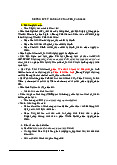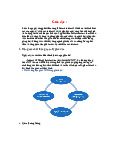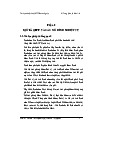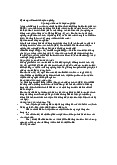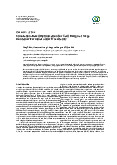







Preview text:
Once upon a time, Roro Anteng and Joko Seger lived on the foot of Mount Bromo. – After six years of marriage, they had not had children. any
They prayed. pleadedto Gods for children. Their prayer was
granted in one condition. They should sacrifice their youngest son to the Bromo crater
After sometime, Roro Antenggave birth to a child, and it happened every year until they
had 25 children. They lived happy and forgot about the agreement. The mount Bromo erupted
signaling that the Gods asked the couple to fulfill their promise. But they didn’t want their youngest
son, RadenKusuma, to be sacrificed to the crater.
RadenKusuma learned about the deal his parents had made. Meanwhile the lava from the crater had
made the people Iiving near the mountain suffered. Since RadenKusurna was a kind and noble man,
he didn’t want his siblings and other people suffered because of him, Therefore he went to Mount
Bromo and sacrificed himself to the crater, The eruption suddenly stopped.After that day, the Tengger
people have given offerings to the crater, as RadenKusumahad sacrificed himself before. 1. What is the text about? A. RoroAnteng B. Mount Bromo C.
RoroAnteng and JokoSeger D. JokoSeger and RadenKusumo
2. From the text we know that Roro Anteng and Joko . A.
agreed to their son’s behavior B.
really loved Raden Kusuma C. disliked their youngest son D. let their son kill himself
3. What can we learn from the text? A.
parents must not promise to do anything B.
keeping our promise is unnecessary C.
all parents love their children D.
we have to fulfill our promise 4.
Arrange the following sentences into a coherent paragraph 1. He was very hungry and weak 2.
Nobody wanted to help the little boy. 3.
Once upon a time, there was a little boy, who was poor, dirty, and smelly. 4. He came into a little village 5.
He knocked at every door and asked for some food, but nobody cared about him 6.
Finally, a generous old woman helped him 7.
She gave him shelter and a meal.
The best arrangement of the sentences is… A.
5 – 1 – 7 – 4 – 2 – 6 – 3 B.
3 – 6 – 2 – 4 – 7 – 1 – 5 C.
3 – 4 – 1 – 5 – 2 – 6 – 7 D.
5 – 1 – 6 – 2 – 4 – 3 – 7
Once upon a time, there was a beautiful princess named Kadita. Because of her beauty she was
called Dewi Srengenge. It means The goddess of sun. Her father was King Munding Wangi. Although he
had a beautiful daughter, he was unhappy because he always expected to have a son.
The King decided to marry Dewi Mutiara. He had a son from her. Dewi Mutiara wanted her son
to become a king in the future. She asked the King to send his daughter away. The King did not agree.
Dewi Mutiara called a black wizard to curse Kadita. She wanted Kadita’s beautiful body full of
ulcer. Then, Kadita’s body was full of ulcer. It smelled bad. The beautiful princess cried. The King was
very sad. No one could cure his daughter’s illness. The King did not want her daughter to be a rumor so
he sent his daughter away. The poor princess did not know where to go. However, she had a noble
heart. She did not have any bad feeling about her step mother.
She walked for almost seven days and seven nights. Then, she came to the South Ocean. The
ocean was so clean and clear. She jumped into the water and swam.
Suddenly, there was a miracle. The ocean water cured her illness. She became more beautiful
than before. She also had a power to command the whole South Ocean. She became a fairy called
Nyi Roro Kidul or The Queen of South Ocean.
5. What cured the princess from her illness? A. The ocean. B. Her noble heart. C. The black wizard. D. The Queen of the Ocean. 6.
Kadita’s beautiful body full of ulcer. (par. 2)
What does the underlined word mean? A. Fragrance B. Perfume C. Smell D. Sore
7. Why did the send his daughter away? A. His son wanted to be a king. B.
Her daughter’s body smelled bad. C.
He did not want her to be a rumor. D.
The princess had a power to command the sea.
8. What do we learn from the story?
A. A good heart will guide us to get blessing life.
B. The south ocean water will cure our illness.
C. Be careful, others may trick us in our life.
D. To get success we must walk far away.
Long time ago there lived a king of a kingdom of Kediri, Raden Putra. He liked cock fighting. One of his
wives told him that the queen had put poison in his food. The king was very angry. Without thinking
deeply, he ordered his soldiers to bring the queen to a wood and kill her. But the soldiers took a pity on
her as at that time she was pregnant. They did not kill her.
When the queen gave birth to a baby boy, she named him Cinde Laras. In his 15, he had a cock. Cinde
Laras liked cock fighting, too. His cock was strong, so it won all fight. Hearing it, the king invited Cinde
Laras to the palace for a cock fighting. In a fight, his cock could easily beat the king’s cock. Everybody was
surprised when Cinde Laras’ cock crowed “Cockledodo, I am Cinde Laras’ cock, who lived in the wood, the son of Raden Putra”
The king was very surprised. Cinde Laras told him that he was the son of the queen who now lived in the
wood. It made the king regretted his unwise decision. The King regretted his unwise decision. After that
the king met the queen in the wood. Then he brought them back to palace and he punished his evil wife. 9.
What does the text tell us about? A. Cinde Laras. B. Raden Putra. C. A cock fighting. D. A King of Kediri Kingdom.
10. Why did the soldiers bring the queen to the forest? A.
Because the soldiers did not like the queen. B.
Because the soldiers are asked by the King. C.
Because the queen put poison into the King’s. D.
Because the queen wanted to live in the forest.
11. What can we learn from the story?
A. Be wise in every decision you make.
B. Honest is the best attitude in our life.
C. Patient will give us a peaceful life.
D. Don’t worry about your future.
12. Arrange these jumbled sentences to make a meaningful narrative text. 1.
When he returned home, his father told him that if he had helped the miners to dig,
they would have bought his salt. 2.
The man next went to a house where a wedding was taking place. 3.
A stupid man was sent by his father to sell salt. 4. There he dug a huge hole. 5.
He first went to a mining area but nobody there wanted his salt. 6.
This made the people angry and they chased him away. The best arrangement is …. A.
3 – 5 – 1 – 2 – 4 – 6 B.
1 – 2 – 3 – 5 – 4 – 6 C.
5 – 6 – 3 – 1 – 3 – 4 D.
6 – 1 – 3 – 5 – 2 – 4
Once, three fish lived in a pond. (13) _____ , just before the sun set, some fishermen passed by the pond
and saw the fish. ‘This pond is full of fish’, they told each other excitedly. ‘We have never fished here
before. We must come back tomorrow morning with our nets and catch these fish!’ So saying, the fishermen left.
When the eldest of the three fish (14) _____ this, he was troubled. He called the other fish together and
said, ‘Did you hear what the fishermen said? We must leave this pond at once. The fishermen will return
tomorrow and kill us all!’ The second of the three fish agreed. (15)_____ , he said. ‘We must leave the pond.’
But the youngest fish laughed. ‘You are worrying without reason’, he said. ‘We have lived in this pond all
our lives, and no fisherman has ever come here. Why should these men return? I am not going anywhere
– my luck will keep me safe’.
The eldest of the fish left the pond that very evening with his entire family. The second fish saw the
fishermen coming in the distance early next morning and left the pond at once with all his family. The
third fish refused to leave even then.
The fishermen arrived and caught all the fish left in the pond. The third fish’s luck did not help him – he was caught and killed. 13. A. Last night B. One morning C. One evening D. Every afternoon 14. A. hear B. heard C. will hear D. have heard 15. A. I don’t know. B. Yes, I did. C. Is that true? D. You’re right.
